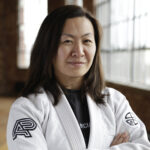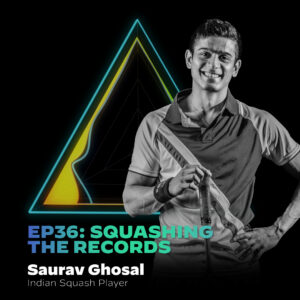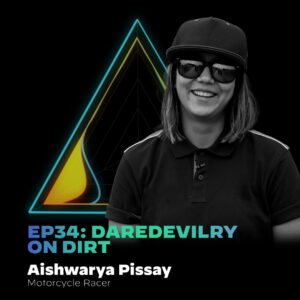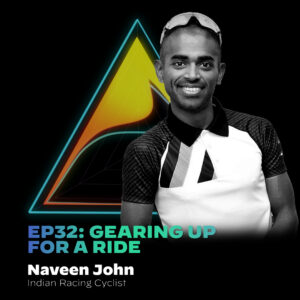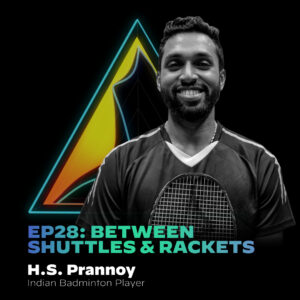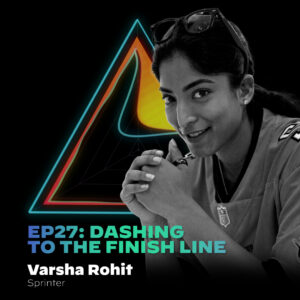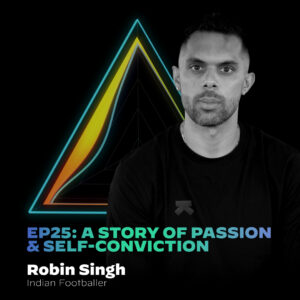Introduction Of Podcast
In this episode, we speak with the inspirational Emily Kwok, a Brazilian Jiu-Jitsu World Champion. She talks about her journey, her high moments, and what keeps her going. You would not want to miss this one. Tune in.
Timestamps
- (00:00 – 02:59) – Introduction
- (04:37 – 09:39) – Emily’s Journey & Success In Jiu-Jitsu
- (09:51 – 11:43) – Emily On Competition Mindset
- (11:46 – 16:32) – Why Pick Jiu-Jitsu?
- (16:44 – 18:52) – Emilys Favourite Jiu-Jitsu Documentry/Movie
- (18:55 – 23:15) – Emily’s Inspirational Athletes
- (23:18 – 26:17) – Emily’s Teaching Philosophy
- (26:18 – 31:22) – Data & Technology In Performance Enhancement
- (31:37 – 35:42) – Top 3 Advice For Jiu-Jitsu Beginners
Key Takeaways – Transcripts
Intro (Mohit): So when it comes to Brazilian jiu jitsu, I’m not sure if any of you know, but Brazilian jiu jitsu is sort of like a modern martial art. And when I say modern, it means that it’s very recent as well. Primarily, it came into the limelight during UFC when the Gracie family sort of, like, reintroduced the world to Brazilian jiu jitsu by sort of like blowing everybody away in terms of their performance at the UFC tournament. And I think if you think about the modern-ness of this martial art now, the reason why it’s so relevant and such an interesting martial art is because it’s not just for people who are competing, which it is great for anyways, but also great for self-defense and also has a great philosophical angle to it, right? There’s a lot of deep philosophy in both the Japanese jiu jitsu and Brazilian jiu jitsu. I know that some of you folks are stickler about which jiu jitsu is better or which jiu jitsu is the original one, but if you look at both the styles individually and appreciate the differences and the commonalities, you’d notice that it has a lot of modern philosophy and ancient philosophy built into it, which is very interesting. And today is special because we are speaking to somebody who has been in the Brazilian jiu jitsu space for a long, long time, and not just competing and has not just been competing, but also been teaching. And that definitely adds a lot of interesting perspective if you want to know about the space. In today’s episode, we’re joined by Emily Kwok, Brazilian jiujitsu coach and a multiple time IBJF World Champion and an MMA veteran. She’s widely regarded as an early pioneer of the BJJ scene in North America, being one of the first females to rise to prominence as the sport expanded worldwide. She has been training and competing since the early 2000s in BJJ, and has won numerous BJJ titles throughout Canada, Japan, and the United States. Off late, Emily is engaged in directing small to large martial arts schools, in addition to strategizing and organizing seminars and camps throughout the USA. Emily shares how she entered the world of Brazilian Jiu-Jitsu and when it was that she took this up professionally. Having won multiple championships, we ask Emily what the competition mindset is and how it impacts her preparation. As every coach has a different philosophy towards the game, we ask Emily what’s hers and how she trains her clients. We ask Emily the role tech can play for athletes in the game to up their performance. If you’re new to BJJ, Emily shares why you should pick this form of martial arts and gives away top 3 ways for you to get started. I won’t take much of your time here. Let’s get to the conversation.
(Mohit): Emily, it’s such a pleasure to have you here. For the longest time, I’ve been a big fan of visiting jiu-jitsu and of course, you as well. And I think being very much into the deep philosophy of Brazilian jiu-jitsu followed Hicks and Gracie, Marcelo Garcia, and can’t wait to talk more about it, but also a huge fan of your work in this space and the continued work in terms of inspiring people to actually become leaders in this space and actually lead such an amazing life. So welcome to the podcast before everything. And yeah, great to have you here.
(Emily): Thank you so much, Mohit. Really, it’s a pleasure. And I’m super excited to hear about the kinds of things that you guys are up to as well. I think both as a practitioner and as an athlete the more information we have about how we perform is better, right? So thank you so much for thinking of me.
Question (Mohit): That’s amazing. And I think I have a lot of interest in jiu-jitsu. So we’d love to ask this from a Jujuto’s perspective as well. A lot of jiu-jitsu actually evolves to be self awareness and awareness of your strengths as well as you can say, to some extent development of the muscle memory, right? To some extent you can’t really remember a technique and there’s a lot said about that. And I think as we add more gadgets and tools and data to this space the core philosophy that we broadly see from our side is that it will only help people sharpen their instincts. But before we get to the subject, what’s been your story? Like, how did you get here? What’s your story of jiu-jitsu?
Answer (Emily): So I actually came to Jiujitsu sort of by I stumbled upon it. I originally was just very interested in working out and being athletic. I was newly out of high school in college and I used to work out a lot, maybe 2-3 hours a day. But I was not achieving the results that I had hoped for both physically or visually. Right? I didn’t look the way I thought I should look as an athlete. I didn’t feel the way that I thought I should feel. And so I had watched a few movies at the time and I stumbled upon this two movies, one of which was not great, but Will Smith started a movie called Ali which is about Muhammad Ali. And then the following year there was a movie released by a new director named Karen Kusama and she released a movie called Girlfight. Girlfight was the first movie that Michelle Rodriguez appeared in and both movies were about boxing. And I was particularly inspired by Michelle Rodriguez’s character as a young woman who was kind of held back from pursuing her interest in boxing because she was a girl. And so I thought it would be interesting to start boxing. And so I tried. I sought out some trainers and after doing boxing for a short while I discovered that I was really bad at it. I was not very coordinated and I also kept injuring myself. And so upon the advice of a friend he had suggested that maybe I want to try grappling like ground wrestling. And I had no idea what that was. So he took me to a Sambo class and from Sambo I found jiu-jitsu primarily because I didn’t have a lot of the culture and the sentiment in the class that I was in with Sambo didn’t allow me to practice. I couldn’t spar just because the instructors and the students didn’t feel it was very ladylike or it wasn’t appropriate for a woman to engage in those activities. So I gravitated then to a jiu-jitsu class upon the suggestion of a friend and I really enjoyed it. It was very different. I’d never seen anything like it and it was a puzzle to me. And I was very inspired watching smaller people in the class be able to hold their own against a larger opponent. So I started it as a hobby. This was back in 99′, and it was at a small community center in Vancouver, and it slowly from there took over my life. And so I did not expect when I began jiu-jitsu for it to become such a big part of my life and my identity. But as such, it has taken me to places that I never thought I would go to.
Question (Mohit): Wow, that’s such an inspiring story. When did it start becoming, you can say, like, massive for you in terms of your interest levels in jiu-jitsu and when did you start seeing success? Because I’m asking this because the first few weeks and months are pretty much like getting beaten up. And I think there is this phase when you start seeing success. When did that happen for you?
Answer (Emily): So it’s interesting, like, you opened the podcast, talking a little bit about how jiu-jitsu helps us become more self aware. And in many ways, it’s about sort of our deep internal knowledge. And I would say that it’s been slightly over two decades that I’ve been practicing that our teaching methods, and how we access jiu-jitsu has also evolved and changed, which helps make it easier. But for myself, I think it probably took six to eight months before I knew what the hell was going on. And at the time, I would say the sentiment for most people who were teaching in the space in Vancouver, I was learning under a blue belt. And, you know, he was one of the few people who knew any jiu-jitsu. And the idea at the time, I think, was more so about let me train people, let me show people what jiu-jitsu is so that I can use them as my training partners and my training dummies less so about developing other good jiu-jitsu players, right? Like, I think at the time it was more self motivated than it was about community or developmentally work related. So to that degree, the way we learned was very disorganised. Like, one day we would learn a guillotine, the next day we would learn a takedown. The following day we would learn a flower sweep. So there was no continuity between the lessons. So it would be the same thing as, like, trying to learn the alphabet out of order, right? So, like, today you’re going to learn A, tomorrow you’re going to learn Z, next day you’re going to learn M, and then you have to figure out how it all strings together. So it was very challenging and I actually think that jiu-jitsu has gentrified a lot more. We still have further to go, but I don’t think it should take the average person six to eight months to figure out what’s going on. Let’s just say it like that. And so I think during my time, it was a bit of a stretch, and I would consider myself to probably still be a bit of an unusual stubborn case to stick with it that long, because I would hope that people would connect the dots earlier.
Question (Mohit): Got it. How much of that is you mentioned that the first few months are obviously the startup months and the curriculum or the methods have become way more structured over time. But how much of that role is sort of like driven how much of that is driven by competition and that mindset of preparing for a competition?
Answer (Emily): Yeah. So I started competing very early. I did my first competition six months in, and I had tried playing a lot of high school team sports, but I was not very good at your traditional sports like volleyball or basketball. And so when I found jiu-jitsu and I went into my first jiu-jitsu competition, I was terrified because I’d never done anything by myself like that. But what competition did was it really stressed the importance of and isolated this idea of what works and what doesn’t work, right? And so performance was now a thing. When you’re just practicing recreationally and there’s no consequence or there’s no risk. In some ways, I feel like there’s a little bit more leniency in saying this matters and that doesn’t or this form should be tightened. This form we can let go. In competition, there are a lot of risks and you have to lay it all on the line. And I say to people, look, it’s not the goal of competing is not to just win gold medals all the time. It’s about learning to push yourself further. However, nobody goes to a competition to lose that’s never anybody’s objective. So when we put everything on the line, I think it does force us to isolate our response and think more critically and feel what is most important in the moment. And I think because of that, it helped my Jiu jitsu journey along, move along much faster, because I was always focused on this idea of, okay, this worked that didn’t toss that out, put something else new in. So it created a sense of urgency and alignment.
Question (Mohit): Got it. That’s a really interesting perspective. Urgency and alignment and being more sort of like, goal-oriented makes a lot of difference. But I would like to also take a step back and for our listeners, well, actually, many of them would actually be new to jiu-jitsu. So they’re into sports. They might be into sports, but still new to jiu-jitsu. So for them from you would love to understand as a new individual looking at the world of sports, fitness, health, how should I view jiu-jitsu? Why did jiu-jitsu out of everything else in the world?
Answer (Emily): So one of the things that I expressed a bit earlier was that I never expected Jiu jitsu to become such a big part of my life. And I think one of the things that took me by surprise was that it was not a sport for the sake of being just another way to exercise, right? So when I would go to the gym, I would have to be conscious of how long I was running on the treadmill, how many sets I was doing, my bicep curls. And so I’m thinking a lot about the actual exercise itself. What I love about jiu-jitsu is that it is a practice. And so a lot of us show up to class and we go on autopilot, we’re there to learn, but what we don’t see is as we’re learning, we’re also exercising. So in an hour’s time, you’ve not only acquired new knowledge, which I think is hugely beneficial for our minds and our bodies, but then beyond that, we’ve also done something with our bodies. Right? And so the idea of exercising for the sake of exercising, or exercising with purpose in mind, I think it takes a lot of load and pressure off this idea of, oh, like, I have to sweat, I have to build muscle, because we’re doing more than just exercising. The other thing that I think is really powerful about jiu-jitsu, beyond even other martial art practices or combat art practices, and by that I mean like
boxing, kickboxing, karate, taekwondo is jiu-jitsu does a brilliant job of weaving theory and practice together very well. And what I mean by that is we go and we learn something, right? So we learn the theory, we understand what we’re supposed to be doing, but beyond that, we actually have the ability to then go practice and apply it right away. So it kind of burns the knowledge in much more effectively than theory just by itself. And so when we’re just doing forms or we’re just doing combos and we’re not applying it against another human body, or we’re not having that energy come back at us, I don’t want to say that it’s less effective, but it’s a different experience. And so much of what we do in a combat sport is we engage with another person’s energy. And jiu-jitsu really allows you to do that without the consequence of perhaps getting a concussion, right? I remember when I would go to boxing practice and they’d say, you’re going to spar today, you have to have somebody drive you there and drive you home just in case you get hit in the head. But in jiu-jitsu, if you practice enough self control and awareness, you should be tapping before you get to the point of injury. Right? So I think there’s just a lot of birds we can kill with 1 stone when we do jiujitsu.
(Mohit): Right. No, I think that’s an amazing answer. I guess all these things I could definitely relate to. The first few months in the gym felt like any of the workout, but I think one of the things that happened almost within a few weeks, maybe a couple of months, is that your ego just gets into check very, very fast. Like, you learn to tap, right? And once you learn to tap, you know, okay, here are my existing limits, and I’m here to learn, practice, and sort of like, fight in a playful way and not sort of like with the intention to hurt anybody or to hurt myself, first of all.
(Emily): Well, that’s the hope, right? That’s the hope. I don’t know how it is by you, but I think that I still see a lot of some people are very stubborn about letting go. And so, you know, I tell a lot of new students when they say, oh, well, this is kind of a ballistic activity. Am I going to get hurt? And I said, look, you could get hurt walking across the street. But the reality is you have to practice some self control and awareness in this sport. And more often than not, when people get hurt doing jiu-jitsu, I find it less to be an accident of your opponent did something to you. Most of the time, it’s like you did not want to let go when you should have, and therefore you twisted your arm or, you know, you bent your knee the wrong way. And I think it’s really very humbling, which is a good practice.
Question (Mohit): No, absolutely. And I think there’s so many and to your point, there’s so many life principles, and I think we should think about the human physiology. When you take up jiu-jitsu or judo or even like something that’s got to do with a little bit of understanding of the human physiology. Like, I think the first time I start training for jitsu, I realized what is the best way to fall on the ground so that you don’t end up hurting your neck and having a concussion, right? So that’s a super interesting principle because you don’t plan for these things ever, right? When it happens, it happens. So that’s a really, really cool point. But on that note, I would love to understand and this is a fan question, right? What’s your favorite jiu-jitsu movie or documentary?
Answer (Emily): My favorite jiu-jitsu movie or documentary. Gosh. I’m not sure that there have been that many good ones made. I think a lot of the attempts from Hollywood to make something of jiu-jitsu have tended to be a little bit poorly produced or melodramatic. Maybe a documentary. Maybe a documentary. I still think, like, we’re very early, but there is God. What is the one that I’m thinking of? Choke Yeah, Choke is good. A very old school one that my husband and I sometimes enjoy watching is Arte Suave. Sust more about movement. Yeah, but I still feel like we have much more terrain that we can explore because it’s still so new. I think for those of us that have been practicing jiu jitsu for a little while myself. I’ve been involved for about 22 years. It can feel like it’s something we’ve done for a long time, but I still think it’s very much new to mainstream culture, and so the quality of what’s being produced hasn’t quite gotten to where I’d like to see it. So, yeah, I wouldn’t say that I necessarily have an absolute favorite. I think there’s a lot of interesting documentary filmmakers and people in the space that are experimenting and putting out shorts. I know there’s, like, Stuart Cooper, and there’s a gentleman from Eatfilms. I think his name is Daniel, if I’m not mistaken, he’s from the UK. But there’s some good guys in the space that are producing shorts. I’d love to see something with, like, more funding that could be done at a really high level that’s actually high quality. So I think sometimes we have high quality, but not the funding to make it as polished. And then sometimes we have funding, but the script and the product is not great.
(Mohit): No, they’re all the Hollywood films in this space.
(Emily): They’ve been horrible. They’ve been terrible. Unwatchable.
Question (Mohit): Absolutely. I think they’re still confused whether it is jiu-jitsu or karate. Okay, extending that. Your favorite set of athletes, folks who inspire you? Folks who inspire me. We’re talking about purely athletes. Anybody? Like, basically, there are so many legends in this space. Anybody’s philosophy that you appreciate? So I would say, well, obviously, my teacher is one of those people, Marcelo Garcia.
Answer (Emily): What I really appreciate about Marcelo is when I had come to him in 2009, I was in a pretty dark period of my jiujitsu career. I was pretty burnt out, and I had left a pretty toxic environment at my old school and gym. And what I enjoyed about Marcelo was that the moment I walked into his school, the first thing I felt was just a purity of love for jiu-jitsu. And I missed that. You know, one of the things that I always tell people as they get deeper into the competitive space, if they choose to make jiu-jitsu a big part of their life, is, don’t forget why you started doing this. Like, don’t forget what this is for you. And for me, jiu jitsu was always about joy and curiosity, right? And pushing myself further. And somewhere along the line, when competition became a big deal and jiu jitsu was my entire life, I got deeply involved in ecosystems that were really unhealthy and toxic, and jiu-jitsu stopped being fun. And when jiu-jitsu stopped being fun and I lost sight of that, I stopped wanting to do jiu-jitsu. So I almost quit as a brown belt. And when I found my joy again, a lot of that was through meeting and training with people who refocused my attention on the sport and how much we can learn and how much we can do from it. So, one, I’ve always appreciated the energy that Marcelo has brought to jiu-jitsu and I think he’s well quoted as saying, like, why are you good at jiu-jitsu? And his thing is, because I’ve always loved it more, right? Like, he’ll always take it to the limit because he loves it so much. He’s a really interesting athlete because of the risks he’s willing to take, how far he’s willing to push, what he does and what he knows and what he doesn’t know. So he’s phenomenal in that respect. I’ve learned a lot from him in terms of how to align myself as a competitor alongside Marcello with one of his first black belts, who’s also a really good friend of mine, Josh Whiteskin. Josh got pretty badly injured on his way up through the jiu-jitsu ranks. However, what I’ve always appreciated about Josh that I don’t think I fully understood for many years was that when I started learning jiu-jitsu, I was also looking for a sage. I was looking for a teacher with wisdom. And I think a lot of us in jiu-jitsu do that. We look at our teachers and we think that they are going to teach us a lot of things, not just jiu-jitsu. It may not even be a conscious thought, right? It may not even be conscious that this person is not that evolved, not that mature. They really should just teach us technique. However, I’ve burned myself many ways looking for more and putting my teachers on pedestals that they probably shouldn’t have been put on. And Josh, for me, kind of helped bridge that gap and heal that wound, because Josh is very much somebody who’s wise, and not just wise in Jiujitsu, but wise in the world. And he’s had many experiences in other competitive arenas, so he’s really helped me understand the difference. And because of that, I think I have a much healthier relationship in Jiu. Jitsu. Outside of that, there’s so many women that I’ve also been inspired by La Caviara and Marcelo’s wife, Tatiana Garcia, with a huge influence in my development as well. So, yeah, those are just a few.
Question (Mohit): Wow. That’s the universe. I think, of course, a huge fan of Marcelo and his work. And I think the way you described, he’s just unbelievable, right? I think amount of energy and love he brings to jiu-jitsu and seems like a super nice guy after being I don’t think anyone would ever tell you that they didn’t like Marcelo. He’s a very pleasant person. He’s very nice to be around. Wow, this is a goosebump moment for me. Definitely, feels amazing. I’m going to switch gears, Emily, and ask you a little bit about what’s your own teaching philosophy, like, as you get into more mentorship, teaching. And when you think about it, why are you teaching and what would be your philosophy?
Answer (Emily): Yeah, I mean, the benefits that I’d mentioned previously, I think Jiujitsu is an incredible medium for us to be able to understand ourselves and to connect the mind and body. Outside of my teaching work in Jiujitsu I work in performance consulting. And one of the biggest gaps that I see is that we function and we live in a world very much today that is totally in our minds, right And I would even say COVID and modern times has exacerbated that because we spend so much time behind the computer, so much time engaging in virtual and artificial environments, that we lose touch with our bodies. But our bodies is who we are. And I think that for many people, when we do not engage with our body, we lose what I call like a somatic intelligence. Our bodies can tell us so much about ourselves, even the way that we should behave just from a feeling or a sensation that we should get. So I want to bring that back into people’s lives. And I don’t think jiu-jitsu has to be only for athletes or tough people. And in fact, if jiu-jitsu is going to become more popular and gentrify, it needs to include average people that never thought that they would do a combat sport at all. And so a lot of my focused teaching and energy is really put towards helping everyday people make that connection, you know, really evolve that relationship to themselves so that they’re more conscious and they’re more empowered to engage the mind and the body together. That’s very big for me, performance and winning competitions I think is a wonderful pursuit. However, I think a lot of people will tell you that have trained with me. It’s not my objective with most students. I don’t really push a big competition team because I also think that performance and competition is something that has to be an individual drive and individual pursuit. I’ve been in situations over the years where I’ve tried to get more people on board to compete. And I understand that to some degree it’s a numbers game. But to put yourself on the line is asking a lot of somebody. And I don’t think that that’s a decision or that’s an influence that I want to have. It’s one thing if someone comes to me and says that they want to push themselves and then I kind of push them a little bit further. But for most people, they don’t have the time and they don’t have the energy to dedicate to what it takes to really compete at a high level. So I’m really a lot more focused and much happier to develop people in all sorts of ways that make sense for them. And so that’s kind of what I put most of my energy towards.
Question (Mohit): The somantic intelligence bet is a phenomenal concept. Really love the approach towards teaching and sort of like extending the legacy of jiu-jitsu to more people. Do you think machines have a role to play as well, like in the future, whether machines or technology data to actually help people develop further sense of somatic intelligence and to know more about themselves. So maybe be more aware?
Answer (Emily): Yeah, absolutely. I mean, look, I think what do they say about data? All data is good, but it’s pretty useless if you don’t know how to read it right or like what to do with it. And so I think we’re in an age now where data has become a lot more accessible. I’m not sure that everyone always knows what to do with it. Maybe people like me or something in between is there to help. But like absolutely, I mean, look, machines are able to calculate and do things that human minds cannot or they do it much faster. And so I like to think of data and machine learning or machines playing a part in what we can do. I myself use like I wear an Oura ring, I have an Apple Watch, I have a chest heart rate monitor. I try to use a lot of this type of feedback as ways to inform my performance. Am I having a good day? Am I having a bad day? Am I tired? These are all really beneficial and useful. Whereas in before, if we didn’t have that access to those machines, if we didn’t have access to that sort of data, we’d sort of be operating in the dark. So I 1000% believe that there is a place for us to use all of the new and novel technology to make ourselves better.
(Mohit): Yeah, I mean, the point is amazing that it’s true that unless you make sense of the data, you have access to a lot of data, it doesn’t really make sense or it doesn’t really add to anything. It’ll just be anxiety because a lot of people would just be thrown with a lot of negatives and positives all around. But once you start making sense of it and it’s pretty much like when you get into a you can say with start learning a new skill, right? So everything that you see is new and when it starts becoming logical for you, it starts flowing around you, right? In many ways that’s phenomenal. And I think from the world of biomarkers, and we are a biomarker company, we actually help people know more about their body via various biomarkers. There is one that you can wear on your arm, like pretty much like a device here and soon launching a product that actually you can wear on your finger as well. So this is about more data about your own body. Actually, you mentioned Oura and Apple Watch of both phenomenal devices as well. So I think our mindset and as we look at the world of sports and fitness, largely the mindset that with which we actually look at it is that once people have more data and if we can help people make more sense out of it. Potentially, a lot more people would figure out what is their lowest hanging fruit. Or, let’s say, the easiest way to get started. Because for a lot of people fitness and health is actually pretty confusing. Yes. Once they get started and start having fun, I think there’s no stopping. I just hope that a lot more people just like you I just hope that a lot more people discover jiu-jitsu along their way as well.
(Emily): Yeah, I mean I think so much of it, it’s interesting because in the abstract things should be left to the abstract meaning in that creative space of how we’re exploring ourselves and pushing our curiosity, doing things more deeply. I think it’s important that we maintain a deep relationship to ourselves and exploration and I don’t know that that should or can always be clearly defined or made into easily digestible bullet points, right? Everyone’s experience should be personal and it should be what it is going to be for them. However, when we want to translate the things that we’ve learned on a personal level and share them with other people, a big thing that I believe in as a teacher is that you have to bring yourself to your audience’s level. So I cannot expect a student or a client to understand everything that I’m thinking or what I’m experiencing. If I want to be an effective communicator, I think a big part of my job is to find out what language they’re speaking or what level they’re on and bring myself to a place where they can understand and they can see. And that might mean breaking it into parts. That might mean introducing some sections before other sections. It could be a lot of different things. But I think if we want more people to pick up Jiu Jitsu, if we want more people to take care of their health using different types of wearable devices, then there has to be that intermediary. There has to be those people, that thing, that system that helps the everyday average person understand the benefits and how to utilize these different mediums or these different devices. And if we can break that down clearly, then people want to grow people. I think it’s an inherent human need to want to be a better person right, or to evolutionary yeah, yeah right. So I think part of my job as a teacher and a communicator is to try and find the most appropriate ways to do that.
Question (Mohit): No, I think that’s a phenomenal concept that people want to learn and if we can actually give them methods and efficient methods to get to micro-learnings first and maybe get them get started on their journey, it eventually becomes much easier once it starts making sense of them. But Emily, it’s been such a pleasure I think definitely learnt a lot and this has been super inspiring as well. We are almost at the end of the podcast but before we end I would love to understand. Actually I have a question for you at the end. So for somebody getting started with Jiujitsu, what would be your top three pointers, advice or whatever, essentially from your side.
Answer (Emily): Know your why. Like, know why you’re doing this. Or, you know, just always keep that in mind because I think that it is very easy when we start doing things subjectively, we enter into something very naively and in jiu-jitsu. It can get very complicated and layered in terms of ecosystems and teams and politics. And I think it’s very important to remember always why you started doing this. What was it about this sport that drew you in and to remember that deeply, because I think it should serve as an anchor. Those things can always evolve, but usually your first instinct is a good instinct. Another thing is, I also think surrounding yourself with good ecosystems is really like it’s an important thing. So I always advise new people, even the ones that come to my school, to not just sign up at my school. I always push them to go, oh, you had two or three places you want to check out. Please go check out those two or three other places. Please go satisfy your curiosity. Make an educated decision why you’re going to do this not that. Reason being, I think culture and environment is so important not only for the student, but for the sustainable culture and longevity of the school. Right? So you want to find an ecosystem that you feel you can be a part of, not something that you’re kind of forcing yourself to fit into. And there’s so many different energies, so many different schools out there. You want to find a place where you truly feel like, well, some of these people will become like family, maybe closer than family to you because you’re going to see them multiple times a week and you’re going to be doing the hardest thing of your week with them. So I think it’s really, really important that you’re aware of the place that you choose to be a part of. The last thing I would say is framing your growth. Are you growing for survival or are you growing for excellence? So if you’re going for survival, it’s kind of like, oh, I just have to get through this class and I’m only going to go to two classes this week and then I’m done, right? Or are you growing for excellence? If you’re growing for excellence, it might be, hey, I can handle two classes a week right now physically, but I’d like to work up to three or four. I’m really interested in learning more about this new guard system. So I’m going to invest some hours off the mats in studying this thing, or I’m going to make some friends and drill these things off to the side. When we frame our learning around excellence, it’s abundance. Anything is possible. We can always do more to get better. If we’re framing our growth around survival, it’s about doing the bare minimum to meet the line. And so if you know how you’re going to frame your learning, I think it can really shape how your practice is cultivated and what you get out of it and hopefully you get to see a lot of growth.
(Mohit): Well, this is not just advice for jiu-jitsu, so I feel this is great advice for life. Yes. Find your why, find your community, right? And basically, what’s your growth framework? Are you looking for excellence or survival, right? It’s such an amazing concept. And first of all, thanks a ton, Emily, for making it here, and I really appreciate the time and I think all the amazing wisdom. This is going to inspire a lot of athletes to actually explore jiu-jitsu who are some of the existing folks who are into jiu-jitsu to actually continue on their journey and be inspired by your journey as well. I think. Secondly, personally, I think this inspires me further to pursue jiu-jitsu. It’s been such a refresher and I really love the conversation and I think what I’m going to do next is to find my community.
(Emily): Awesome, Mohit. I’m really I’m glad and thank you so much for seeking me out and it’s been a pleasure. Likewise.
(Mohit): And thank you, Emily. I think we should definitely, we’d love to stay in touch and figure out any future collaborations as well, given that this we are so philosophically aligned in terms of so many things that we do.
(Emily): Yeah, absolutely. Yeah. I can’t wait to see your device in America. Please bring it.
(Mohit): We will I think we will get there very, very soon. That’s the aim. So. Thank you, Emily. Thanks a ton. Thank you.
Outro (Mohit): I hope you enjoyed listening to the conversation with Emily as much as I did, speaking to her. Having dabbled in the game, it was very inspiring and insightful to chat with someone who has been there and won it all in BJJ, the game is about not how strong you are physically, but also mentally. And of course, there’s a strong philosophical angle to the game as well. If you want to have your favorite athlete or personality on the Ultrahuman Podcast, please feel free to let us know on our social channels by tagging us @UltrahumanHQ. Don’t forget to show us some love on Spotify and Apple Podcasts by rating our show and reviewing. Your feedback goes a long way and helps us improve what we are bringing to you. I’ll see you soon with the next episode.



